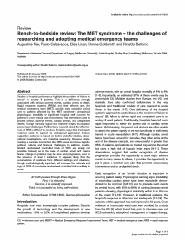Please use this identifier to cite or link to this item:
https://ahro.austin.org.au/austinjspui/handle/1/10522Full metadata record
| DC Field | Value | Language |
|---|---|---|
| dc.contributor.author | Tee, Augustine | en |
| dc.contributor.author | Calzavacca, Paolo | en |
| dc.contributor.author | Licari, Elisa | en |
| dc.contributor.author | Goldsmith, Donna | en |
| dc.contributor.author | Bellomo, Rinaldo | en |
| dc.date.accessioned | 2015-05-15T23:59:33Z | |
| dc.date.available | 2015-05-15T23:59:33Z | |
| dc.date.issued | 2008-01-23 | en |
| dc.identifier.citation | Critical Care 2008; 12(1): 205 | en |
| dc.identifier.govdoc | 18254927 | en |
| dc.identifier.other | PUBMED | en |
| dc.identifier.uri | https://ahro.austin.org.au/austinjspui/handle/1/10522 | en |
| dc.description.abstract | Studies of hospital performance highlight the problem of 'failure to rescue' in acutely ill patients. This is a deficiency strongly associated with serious adverse events, cardiac arrest, or death. Rapid response systems (RRSs) and their efferent arm, the medical emergency team (MET), provide early specialist critical care to patients affected by the 'MET syndrome': unequivocal physiological instability or significant hospital staff concern for patients in a non-critical care environment. This intervention aims to prevent serious adverse events, cardiac arrests, and unexpected deaths. Though clinically logical and relatively simple, its adoption poses major challenges. Furthermore, research about the effectiveness of RRS is difficult to conduct. Skeptics argue that inadequate evidence exists to support its widespread application. Indeed, supportive evidence is based on before-and-after studies, observational investigations, and inductive reasoning. However, implementing a complex intervention like RRS poses enormous logistic, political, cultural, and financial challenges. In addition, double-blinded randomised controlled trials of RRS are simply not possible. Instead, as in the case of cardiac arrest and trauma teams, change in practice may be slow and progressive, even in the absence of level I evidence. It appears likely that the accumulation of evidence from different settings and situations, though methodologically imperfect, will increase the rationale and logic of RRS. A conclusive randomised controlled trial is unlikely to occur. | en |
| dc.language.iso | en | en |
| dc.subject.other | Cardiopulmonary Resuscitation | en |
| dc.subject.other | Critical Care.organization & administration | en |
| dc.subject.other | Emergencies | en |
| dc.subject.other | Heart Arrest.mortality.therapy | en |
| dc.subject.other | Humans | en |
| dc.subject.other | Intensive Care Units.organization & administration | en |
| dc.subject.other | Patient Care Team.organization & administration | en |
| dc.subject.other | Research | en |
| dc.subject.other | Time Factors | en |
| dc.title | Bench-to-bedside review: The MET syndrome--the challenges of researching and adopting medical emergency teams. | en |
| dc.type | Journal Article | en |
| dc.identifier.journaltitle | Critical Care | en |
| dc.identifier.affiliation | Department of Intensive Care, Austin Hospital, Studley Road, Heidelberg, Melbourne, Victoria 3084, Australia | en |
| dc.identifier.doi | 10.1186/cc6199 | en |
| dc.description.pages | 205 | en |
| dc.relation.url | https://pubmed.ncbi.nlm.nih.gov/18254927 | en |
| dc.type.austin | Journal Article | en |
| local.name.researcher | Bellomo, Rinaldo | |
| item.grantfulltext | open | - |
| item.openairetype | Journal Article | - |
| item.languageiso639-1 | en | - |
| item.fulltext | With Fulltext | - |
| item.openairecristype | http://purl.org/coar/resource_type/c_18cf | - |
| item.cerifentitytype | Publications | - |
| crisitem.author.dept | Intensive Care | - |
| crisitem.author.dept | Data Analytics Research and Evaluation (DARE) Centre | - |
| Appears in Collections: | Journal articles | |
Files in This Item:
| File | Description | Size | Format | |
|---|---|---|---|---|
| 18254927.pdf | 224.12 kB | Adobe PDF |  View/Open |
Page view(s)
32
checked on Nov 18, 2024
Download(s)
116
checked on Nov 18, 2024
Google ScholarTM
Check
Items in AHRO are protected by copyright, with all rights reserved, unless otherwise indicated.
